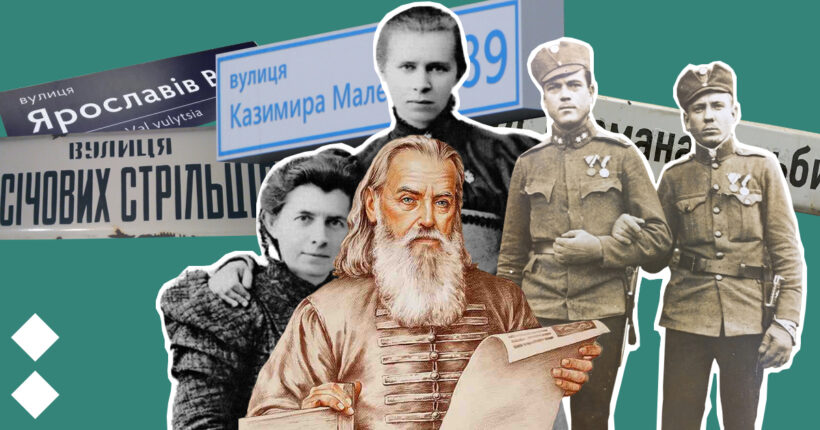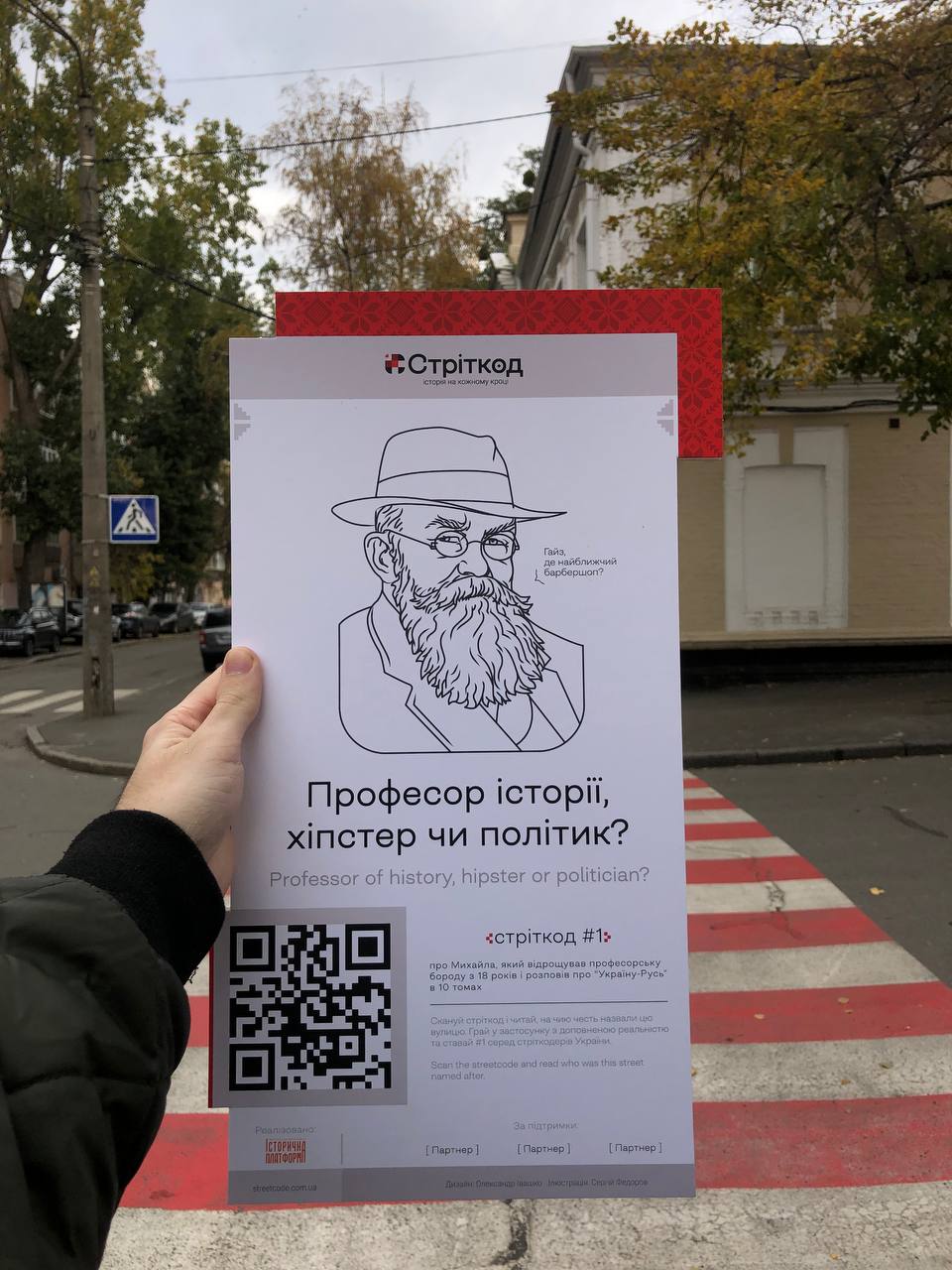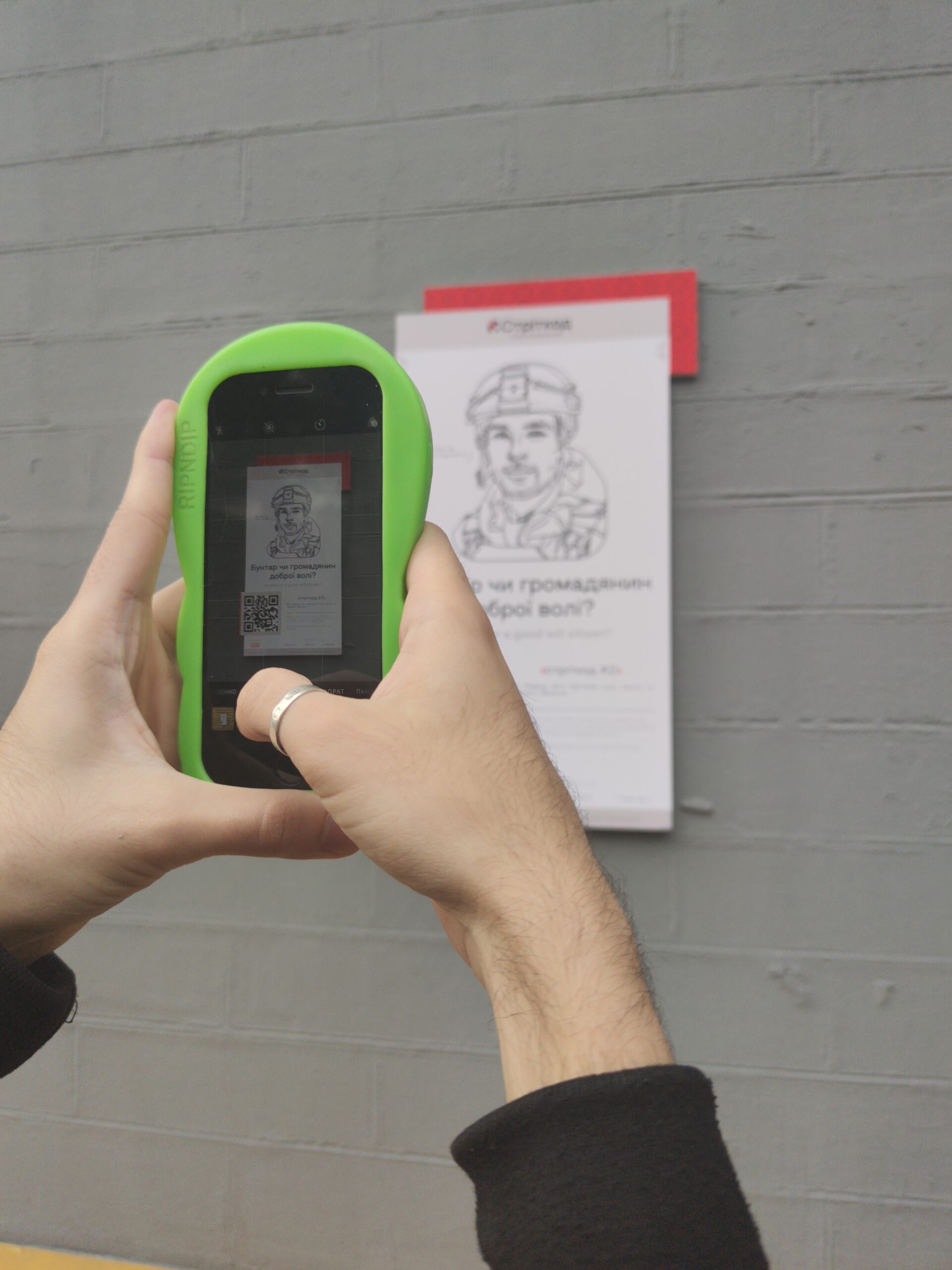
What is the problem?
Can't hear what streets are saying
Many streets named after outstanding people of Ukraine often don't give us a hint of who they're devoted to. However, they should. Everyone has to be aware of what was done by Dmytro Dontsov, what Olena Pchilka was remarkable for, how Malevich affected the world, who were the Legion of Ukrainian Sich Riflemen (Ukrainski sichovi stril'tsi), and so on.
This is even more true about modern heroes — we hear new names of people who desperately defend the country every day. And we cannot always remember each of them. For various reasons, we are not always interested in names in street names. That's a shame because our history and the evolution of views are encoded in them.
Ukrainians need streets with Ukrainian identity. Ukrainians need knowledge of their own history and the interrelationships between events — not to give any chance to return to foreign culture or history in the future.

What is the solution?
"History at every turn"
History lives in specific names, is connected to particular events and is reflected in urban spaces. The participants of the project "Streetcode: history at every turn" united around history in the city spaces and to fill the gaps in the historical memory of Ukrainians. Last fall, they registered the NGO "Historical Platform." And already in the winter, they conducted the first detailed survey and found out that:
- 98% of respondents over the age of 18 consider it important for Ukrainians to know their own history. At the same time, almost 77% of respondents are interested in it "for themselves," and about 14% are not interested but would like to.
- Almost 87% of respondents see a connection between russia's current war against Ukraine and insufficient attention to the study of history. At the same time, only 35% of respondents rated school teaching as good.
By the way, the survey is ongoing, and you can join it via the link.
"The spaces of our cities are still not eloquent enough in terms of history, not useful enough in terms of education, not informative enough in general. We created the project "Streetcode: history at every turn" to change this," the head of the NGO Inna Krupnyk says.
How does it work?
Thousands of stories
"Streetcode: History at Every Turn" is the biggest online platform telling us about Ukrainian history embedded in city spaces. For this purpose, the "Streetcode" team organizes the collection and verification process with professional historians to learn more about outstanding people and the remarkable events our streets were named after. And that's the point when it all begins. Streets and buildings are marked with trending pictures and annotations accompanied by QR codes providing access to the "historical platform."
The "Streetcode" team has an ambitious goal to reach – more than 1000 stories full of exciting and not widely-known facts about old and new heroes. And all this variety of more than 1K stories is going to be integrated into public city spaces.

"Imagine that you are walking down a familiar street and suddenly notice a beautiful sign. It offers to learn more about a person from the name of the street, and you think to yourself: really, who is it? Go to the site and listen or read a cool story, which you can then retell to friends, children, colleagues — to anyone! Or you study at school, and you need a biology essay. About Vernadsky! "Streetcode" will also help with this.
I hope interesting acquaintances and collaborations await us this year, particularly with educators. After all, thematic quests and excursions that we plan to launch could be an excellent addition to the educational process," Natalya Demidova, NGO co-founder, says.
Does it really work?
Streetcode is a mix of many creators' dreams, values, and motivations. Such synergy works even at a distance: people are scattered across cities and work remotely, but "Streetcode" is dynamic — it moves, lives, and is embodied. The project is currently volunteer, but experienced designers, illustrators, leading historians, and sociologists have already united for its implementation. IT support is made by SoftServe Academy, department of the Talent Acceleration Center, a part of one of the most influential players on Ukraine's IT market.
"We already have mock-ups of street codes and illustrations for the first pool of streets. The author's articles are being prepared, and the site is being actively developed. We strive to strengthen the Ukrainian identity and information security of Ukrainians through history, accessible and known at the distance of a click. And you just have to see it," Natalya shares.
Even more historically useful solutions!
In the first run, the emphasis is on the educational component. These are QR codes and the platform itself. Over time, and quite soon, an entertainment "base" will also be added: based on street codes, itineraries of thematic quests and excursions with augmented reality will be built. This is an interactive "smart encyclopedia."
The project will start in pilot cities and later be scaled throughout Ukraine. Which cities the organizers chose for the pilot is still a secret. Permits are required to install street codes, so Historical Platform NGO is currently negotiating with several city councils and will soon announce which city will be the first!





